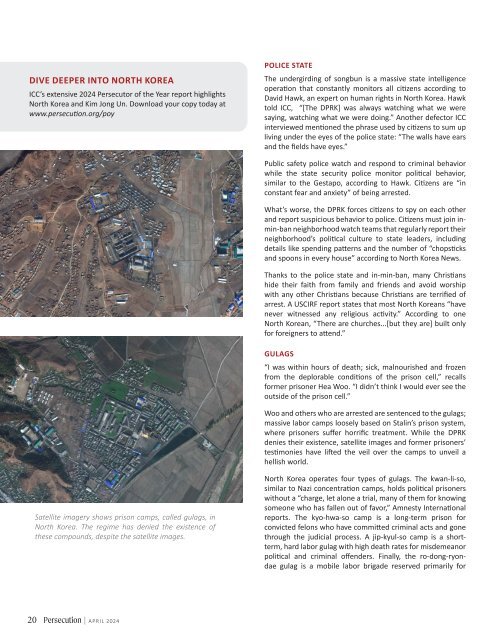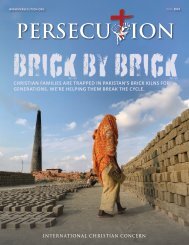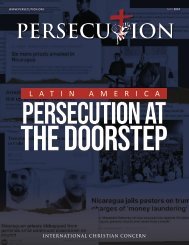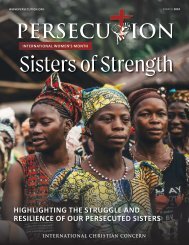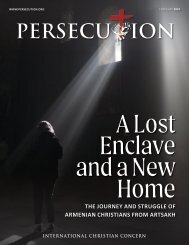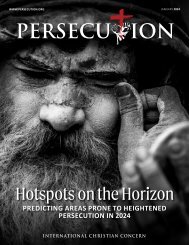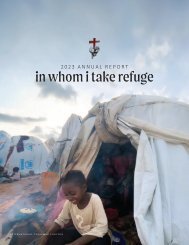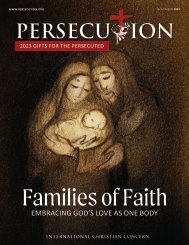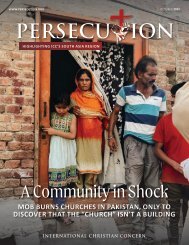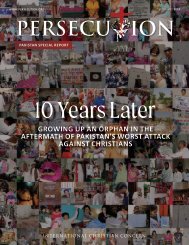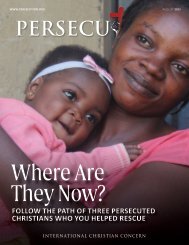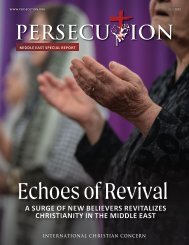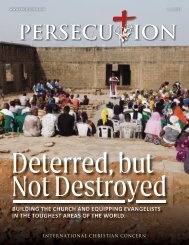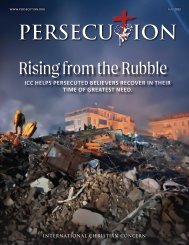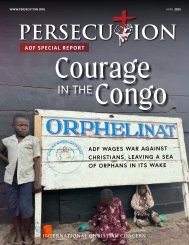April 2024 Persecution Magazine
Create successful ePaper yourself
Turn your PDF publications into a flip-book with our unique Google optimized e-Paper software.
DIVE DEEPER INTO NORTH KOREA<br />
ICC’s extensive <strong>2024</strong> Persecutor of the Year report highlights<br />
North Korea and Kim Jong Un. Download your copy today at<br />
www.persecution.org/poy<br />
POLICE STATE<br />
The undergirding of songbun is a massive state intelligence<br />
operation that constantly monitors all citizens according to<br />
David Hawk, an expert on human rights in North Korea. Hawk<br />
told ICC, “[The DPRK] was always watching what we were<br />
saying, watching what we were doing.” Another defector ICC<br />
interviewed mentioned the phrase used by citizens to sum up<br />
living under the eyes of the police state: “The walls have ears<br />
and the fields have eyes.”<br />
Public safety police watch and respond to criminal behavior<br />
while the state security police monitor political behavior,<br />
similar to the Gestapo, according to Hawk. Citizens are “in<br />
constant fear and anxiety” of being arrested.<br />
What’s worse, the DPRK forces citizens to spy on each other<br />
and report suspicious behavior to police. Citizens must join inmin-ban<br />
neighborhood watch teams that regularly report their<br />
neighborhood’s political culture to state leaders, including<br />
details like spending patterns and the number of “chopsticks<br />
and spoons in every house” according to North Korea News.<br />
Thanks to the police state and in-min-ban, many Christians<br />
hide their faith from family and friends and avoid worship<br />
with any other Christians because Christians are terrified of<br />
arrest. A USCIRF report states that most North Koreans “have<br />
never witnessed any religious activity.” According to one<br />
North Korean, “There are churches...[but they are] built only<br />
for foreigners to attend.”<br />
GULAGS<br />
“I was within hours of death; sick, malnourished and frozen<br />
from the deplorable conditions of the prison cell,” recalls<br />
former prisoner Hea Woo. “I didn’t think I would ever see the<br />
outside of the prison cell.”<br />
Woo and others who are arrested are sentenced to the gulags;<br />
massive labor camps loosely based on Stalin’s prison system,<br />
where prisoners suffer horrific treatment. While the DPRK<br />
denies their existence, satellite images and former prisoners’<br />
testimonies have lifted the veil over the camps to unveil a<br />
hellish world.<br />
Satellite imagery shows prison camps, called gulags, in<br />
North Korea. The regime has denied the existence of<br />
these compounds, despite the satellite images.<br />
North Korea operates four types of gulags. The kwan-li-so,<br />
similar to Nazi concentration camps, holds political prisoners<br />
without a “charge, let alone a trial, many of them for knowing<br />
someone who has fallen out of favor,” Amnesty International<br />
reports. The kyo-hwa-so camp is a long-term prison for<br />
convicted felons who have committed criminal acts and gone<br />
through the judicial process. A jip-kyul-so camp is a shortterm,<br />
hard labor gulag with high death rates for misdemeanor<br />
political and criminal offenders. Finally, the ro-dong-ryondae<br />
gulag is a mobile labor brigade reserved primarily for<br />
20<br />
<strong>Persecution</strong> | APRIL <strong>2024</strong>


